
IELTS Writing task 2 - chủ đề chủ đề Advertisements
Đ thi IELTS Writing task 2 ngày 26/11/2016ề
Advertisements are becoming more and more common in everyday life. Is it a positive or
negative development?
B c đ u tiên trongướ ầ 6 b c vi t bài Writing task 2ướ ế chính là b c phân tích câu h i. Đây ch là ướ ỏ ỉ
m t b c đ m, ch t n kho ng 1-2 phút đ g ch ra keywords cũng nh xác đ nh d ng đ . Tuyộ ướ ệ ỉ ố ả ể ạ ư ị ạ ề
nhiên, b c này hoàn toàn không đ c coi th ng vì thi u nó, các b n r t d b “sai đ ng ướ ượ ườ ế ạ ấ ễ ị ườ
l c l i” đ y.ạ ố ấ
Phân tích đ bàiề
– Keywords: Advertisements
– Micro-keywords: becoming, common, everyday life
– Action keywords: positive or negative? → D ng bài Opinion Essay.ạ
C u trúc bài vi tấ ế
Introduction:
Gi i thi u topic.ớ ệ
Tr l i câu h i theo h ng đ ng ý.ả ờ ỏ ướ ồ
Body 1:
Topic sentence: Qu ng cáo phát tri n có m t s m t l i.ả ể ộ ố ặ ợ
Supporting idea 1: Qu ng cáo phát tri n thúc đ y mua s m, tiêu th , qua đó thúc đ y ả ể ẩ ắ ụ ẩ
s n xu t và kinh doanh.ả ấ
Supporting idea 2: Khi ngành qu ng cáo m r ng, c n m t l ng l n lao đ ng liên ả ở ộ ầ ộ ượ ớ ộ
quan -> gi m thi u nguy c th t nghi p c a nhi u ng i.ả ể ơ ấ ệ ủ ề ườ
Body 2:
Topic sentence: Ng c l i, qu ng cáo nhi u quá và quá tràn lan thì có m t s b t c p.ượ ạ ả ề ộ ố ấ ậ
Supporting idea 1: Gia tăng l i s ng ch nghĩa tiêu th , s h u v t ch t.ố ố ủ ụ ở ữ ậ ấ
Supporting idea 2: Qu ng cáo có nh ng n i dung nh y c m, b o l c, qu y r i tràn lan ả ữ ộ ạ ả ạ ự ấ ố
khi n tr b đ u đ c mà các b c ph huynh khó có th ngăn c n.ế ẻ ị ầ ộ ậ ụ ể ả
Conclusion: K t lu n câu h i và kh ng đ nh ý ki n b n thân thêm 1 l n n a.ế ậ ỏ ẳ ị ế ả ầ ữ Chú ý khi vi t ế
k t lu n, thay vì dài dòng m t th i gian, hãy t p trung thâu tóm l i v n đ m t l n n a, gói ế ậ ấ ờ ậ ạ ấ ề ộ ầ ữ
g n n i dung trong 1-2 câu ọ ộ thôi nhé.
Gi i đ thi IELTS Writing task 2 ngày 26/11/2016ả ề
Bài m u tham kh oẫ ả
Technological advances nowadays have paved the way for the unprecedented popularity
of advertisements. I believe that this trend can have both positive and negative impacts in equal
measure, as now will be discussed.
That advertising is becoming ubiquitous can be seen as beneficial for several reasons. Firstly,
the burgeoning of advertising industry somehow reflects the economic development of a country
because advertising can encourage commodity consumption, which, as a result,
allows entrepreneurs to expand and develop their markets. This leads to a dynamic and strong
economy. Secondly, advertising now is a separate field which creates a lot of job opportunities
for people working as a graphic designer, a marketer, etc.The more prevalent advertisements
are, the higher the demand for jobs in this industry becomes, which contributes to the decrease
in unemployment rates.
Despite some good impacts mentioned above, I believe that the increasing popularity of
advertising is also a detrimental development to some extent. The main drawback is that it can
encourage a society of consumerism in which people become more inclined to think that
material possessions are essential to true happiness. For example, when watching an
advertisement having celebrity endorsement, customers may develop an aspire to consume the
things that these successful people do, from daily items such as designer clothes
to extravagant things like a jet, even though buyers do not truly need it. Possessing these
advertised items may end up to be a measure of how wealthy a person is. In addition, when
advertisements become pervasive, parents will find it difficult to control the amount of unsuitable
content that can reach their children. For example, some pop-ups on the Internet may include
sexuality or violence, formingwrong behaviours among children. However, protecting children
from these is nearly impossible for parents because they are too pervasive.
In conclusion, despite some positives, I hold the opinion that the prevalence of advertisements
also triggers adverse effects.
*Chú ý: Sau khi vi t bài, đ ng quên ki m tra l i bài m t l n n a, đ ch c ch n b n không ế ừ ể ạ ộ ầ ữ ể ắ ắ ạ
m c b t kỳ m tắ ấ ộ l i chính t ph bi nỗ ả ổ ế và đáng ti c nào nhé.ế
T v ng hayừ ự
Advance (n): the forward movement of a group of people, especially armed forces
– B c ti n/ s phát tri nướ ế ự ể
Ex: We feared that an advance on the capital would soon follow.
Pave the way (idiom): (for somebody/something) to create a situation in which
somebody will be able to do something or something can happen. – T o thu n l iạ ậ ợ
Ex: This decision paved the way for changes in employment rights for women.
Unprecedented (adj): that has never happened, been done or been known before – Ch aư
t ng cóừ
Ex: There were unprecedented scenes of violence in the city’s main square.
Advertisement (n): a notice, picture or film telling people about a product, job or
service – Qu ng cáoả
Ex: Put an advertisement in the local paper to sell your car.
Ubiquitous (adj): seeming to be everywhere or in several places at the same time; very
common – Ph bi n/ thông d ngổ ế ụ
Ex: the ubiquitous bicycles of university towns
Burgeon (adj): b t đ u phát tri nắ ầ ề
Reflect (v): to show the image of somebody/something on the surface of something such
as a mirror, water or glass – Ph n chi u/ ph n ánhả ế ả
Ex: His face was reflected in the mirror.
Encourage (v): to give somebody support, courage or hope – Thúc đ y/ c vũẩ ổ
Ex: We were greatly encouraged by the positive response of the public.
Consumption (n): the act of buying and using products – S tiêu thự ụ
Ex: Consumption rather than saving has become the central feature of contemporary societies.
Entrepreneur (n): a person who makes money by starting or running businesses,
especially when this involves taking financial risks – Ng i m i kinh doanhườ ớ
Ex: Entrepreneurs always find it difficult to sell their products for new customers.
Prevalent (adj): that exists or is very common at a particular time or in a particular
place – N i ti ng, ph bi n, thông d ngổ ế ổ ế ụ
Ex: These prejudices are particularly prevalent among people living in the North.
Detrimental (adj): harmful – Nguy hi mể
Ex: The policy will be detrimental to the peace process.
Drawback (n): a disadvantage or problem that makes something a less attractive idea
– B t l i/ v n đấ ợ ấ ề
Ex: The main drawback to it is the cost.
Consumerism (n): the buying and using of goods and services; the belief that it is good
for a society or an individual person to buy and use a large quantity of goods and services
– S tiêu th hàng hoáự ụ
Ex: green consumerism (= the buying of products that are not harmful to the environment)
Incline (v): to tend to think or behave in a particular way; to make somebody do this
Suy nghĩ bình th ng, thông th ngườ ườ
Ex: I incline to the view that we should take no action at this stage.
Possession (n): having/owning – S h uở ữ
Ex: I The gang was caught in possession of stolen goods.
Celebrity (n): a famous person – Ng i n i ti ngườ ổ ế
Ex: TV celebrities
Endorsement (n): a public statement or action showing that you support
somebody/something – S xác nh n, prự ậ
Ex: The election victory is a clear endorsement of their policies.
Extravagant (adj): spending a lot more money or using a lot more of something than
you can afford or than is necessary – Lãng phí/ phung phí/ quá độ
Ex: I felt very extravagant spending £100 on a dress.
Wealthy (adj): having a lot of money, possessions, etc. – Giàu có
Ex: The couple are said to be fabulously wealthy.
Pervasive (adj): existing in all parts of a place or thing; spreading gradually to affect all
parts of a place or thing – Lan t aỏ
Ex: a pervasive smell of damp
Trigger (v): to make something happen suddenly – Châm ngòi, thúc đ yẩ
Ex: Nuts can trigger off a violent allergic reaction
Adverse (adj): negative and unpleasant; not likely to produce a good result – Tiêu c cự
Ex: Lack of money will have an adverse effect on our rese8arch programme.
B n d ch ti ng Vi tả ị ế ệ
Ti n b công ngh ngày nay đã m đ ng cho s phát tri n ch a t ng có c a qu ng cáo. Tôiế ộ ệ ở ườ ự ể ư ừ ủ ả
tin r ng xu h ng này đ ng th i có th có tác đ ng tích c c và tiêu c c, nh tôi s phân tích ằ ướ ồ ờ ể ộ ự ự ư ẽ
sau đây.
Qu ng cáo đang tr nên ph bi n có th đ c xem là có l i vì nhi u lý do. Th nh t, s phát ả ở ổ ế ể ượ ợ ề ứ ấ ự
tri n c a ngành qu ng cáo b ng cách nào đó ph n ánh s phát tri n kinh t c a m t qu c ể ủ ả ằ ả ự ể ế ủ ộ ố
gia b i vì qu ng cáo có th khuy n khích tiêu th hàng hóa, k t qu là, cho phép các doanh ở ả ể ế ụ ế ả
nghi p m r ng và phát tri n th tr ng c a h . Đi u này d n đ n m t n n kinh t năng ệ ở ộ ể ị ườ ủ ọ ề ẫ ế ộ ề ế
đ ng và m nh m . Th hai, qu ng cáo bây gi là m t lĩnh v c riêng bi t t o ra nhi u c h i ộ ạ ẽ ứ ả ờ ộ ự ệ ạ ề ơ ộ
vi c làm cho nh ng ng i làm vi c nh m t nhà thi t k đ h a, nhà ti p th , v.v. Các qu ng ệ ữ ườ ệ ư ộ ế ế ồ ọ ế ị ả
cáo ph bi n h n, nhu c u vi c làm trong ngành càng cao, đi u này góp ph n làm gi m t l ổ ế ơ ầ ệ ề ầ ả ỷ ệ
th t nghi p.ấ ệ
M c dù có m t s tác đ ng t t đ c đ c p trên, tôi tin r ng s phát tri n không ki m soát ặ ộ ố ộ ố ượ ề ậ ở ằ ự ể ể
c a qu ng cáo cũng là m t s phát tri n b t l i m t m c đ nào đó. H n ch chính là nó ủ ả ộ ự ể ấ ợ ở ộ ứ ộ ạ ế
có th khuy n khích m t xã h i c a ch nghĩa tiêu dùng phát tri n, trong đó m i ng i nghĩ ể ế ộ ộ ủ ủ ể ọ ườ
r ng tài s n v t ch t là đi u c n thi t cho h nh phúc th c s . Ví d , khi xem qu ng cáo có sằ ả ậ ấ ề ầ ế ạ ự ự ụ ả ự
ch ng th c c a ng i n i ti ng, khách hàng xu h ng làm theo nh ng ng i thành công này ứ ự ủ ườ ổ ế ướ ữ ườ
làm, t các v t d ng hàng ngày nh qu n áo thi t k đ n nh ng th xa hoa nh máy bay, ừ ậ ụ ư ầ ế ế ế ữ ứ ư
m c dù ng i mua không th c s c n nó. Ngoài ra, khi qu ng cáo tr nên ph bi n, các b c ặ ườ ự ự ầ ả ở ổ ế ậ
cha m s khó ki m soát l ng n i dung không phù h p v i con cái h . Ví d : m t s c a s ẹ ẽ ể ượ ộ ợ ớ ọ ụ ộ ố ử ổ
b t lên trên Internet có th bao g m tình d c ho c b o l c, hành vi gây r i gi a tr em. Tuy ậ ể ồ ụ ặ ạ ự ố ữ ẻ
nhiên, vi c b o v tr em g n nh không làm đ c vì chúng quá ph bi n.ệ ả ệ ẻ ầ ư ượ ổ ế
Tóm l i, m c dù m t s tích c c, tôi gi quan đi m r ng s ph bi n c a qu ng cáo cũng ạ ặ ộ ố ự ữ ể ằ ự ổ ế ủ ả
gây ra nhi u tác d ng ph .ề ụ ụ
có thể bạn quan tâm
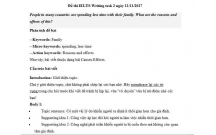
IELTS Writing task 2 - chủ đề Family
5
2.849
771
Luyện thi IELTS
5
(New)
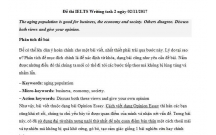
IELTS Writing task 2 - chủ đề chủ đề Population
5
2.279
749
Luyện thi IELTS
5
(New)
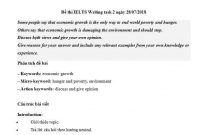
IELTS Writing task 2 - chủ đề chủ đề economic
4
3.749
691
Luyện thi IELTS
4
(New)
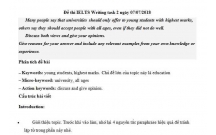
IELTS Writing task 2 - chủ đề chủ đề University
5
3.919
776
Luyện thi IELTS
5
(New)
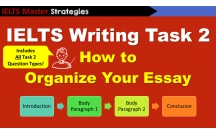
Đề thi IELTS Writing task 2 ngày 28/07/2018
3
1.577
411
Luyện thi IELTS
3
(New)

Tiêu chí chấm thi IELTS Writing task 1
5
3.010
501
Luyện thi IELTS
5
(New)
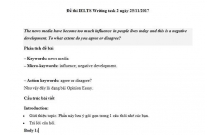
IELTS Writing task 2 - chủ đề news media
5
3.433
708
Luyện thi IELTS
5
(New)
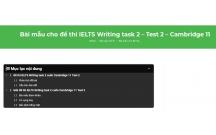
Cambridge 11 - hướng dẫn làm bài IELTS Writing task 2
4
1.282
426
Luyện thi IELTS
4
(New)
thông tin tài liệu
IELTS Writing task 2 - chủ đề chủ đề Advertisements
Từ vựng hay
• Advance (n): the forward movement of a group of people, especially armed forces – Bước tiến/ sự phát triển
Ex: We feared that an advance on the capital would soon follow.
• Pave the way (idiom): (for somebody/something) to create a situation in which somebody will be able to do something or something can happen. – Tạo thuận lợi
Ex: This decision paved the way for changes in employment rights for women.
• Unprecedented (adj): that has never happened, been done or been known before – Chưa từng có
Ex: There were unprecedented scenes of violence in the city’s main square.
Mở rộng để xem thêm
từ khóa liên quan
tài liệu mới trong mục này
tài liệu hot trong mục này
tài liệu giúp tôi
Nếu bạn không tìm thấy tài liệu mình cần có thể gửi yêu cầu ở đây để chúng tôi tìm giúp bạn!
xem nhiều trong tuần
Địa lý 12 Phát triển cây công nghiệp lâu năm Tây Nguyên
Giáo trình Quản trị học của Đại học kinh tế quốc dân
4 đề thi học sinh giỏi Toán lớp 2, có đáp án kèm theo
MẪU GIỚI THIỆU CHUYỂN SINH HOẠT HỘI
Đề thi và lời giải môn xác suất thống kê của trường Học viện ngân hàng
BIỂU MẪU ĐỀ NGHỊ NHẬP KHẨU THUỐC CHƯA CÓ GIẤY ĐĂNG KÝ LƯU HÀNH THUỐC TẠI VIỆT NAM KHÔNG VÌ MỤC ĐÍCH THƯƠNG MẠI
yêu cầu tài liệu
Giúp bạn tìm tài liệu chưa có
×



